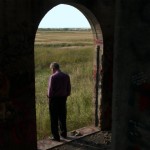The season of Lent is comprised of the roughly forty days between Ash Wednesday and Easter Sunday. Lent is focused on the themes of repentance, mortality, and the need for salvation. Many Christians fast from certain pleasures during this time in order to demonstrate repentance or grow in faith. For Lutherans, this practice is not mandated but may be a helpful one for certain believers. Lent can also be a wonderful time of connection to the historical and global church.
This Lent, I would like to invite my readers to journey with me through the Gospel readings from the Revised Common Lectionary. (This is a system of Scripture readings that is used in most liturgical churches.) Whether you are a longtime believer or a skeptic, I’m happy to have you along for the journey and for the opportunity to share with you these powerful passages from the life of Christ. We will begin with Jesus’s baptism, temptation, and launch of ministry (Mark 1:9-15). We will hear Christ’s call to take up our cross and follow Him (Mark 8:21-38). We will see how Jesus cleansed the Temple in Jerusalem and see how that might relate to modern religious people today (John 2:13-22). We will hear the amazing declaration that “God so loved that world that He sent His Son” (John 3:14-21). And finally we will hear Jesus’s prediction of His pending death and promise that regeneration will come out of death and decay (John 12:20-33).
As I reflected on these Gospel passages for Lent this year, I was struck by the way God guides the Christian experientially through the life of Christ. Salvation is something that is given, not earned (Ephesians 2:8-9), but when it is given, we are made a child of God (John 1:12). John is bold enough to write:
See what great love the Father has lavished on us, that we should be called children of God! And that is what we are! The reason the world does not know us is that it did not know him. Dear friends, now we are children of God, and what we will be has not yet been made known. But we know that when Christ appears, we shall be like him, for we shall see him as he is.–John 3:1-2 NIV
As children of God, we walk in Jesus’s steps (Hebrews 12:1-3, I Peter 2:21). Christ lives out His life through us. That is why I want to focus on these Gospel passages from the life of Christ. They show us something about what it means–or should mean–to be a Christian.
The first passage for Lent is Mark 1:9-15. In this passage, Jesus is baptized by John the Baptist (his cousin). As He comes up out of the water, the Father speaks from heaven, “You are my Son, whom I love; with you I am well pleased” (vs.11). The Father imparts blessing to the Son.
Likewise, when each of us is baptized, God’s blessing is imparted to us. We are declared a child of God in that moment. The Holy Spirit is given to us.
I used to struggle very much with the reasoning behind Jesus needing to be baptized. I’m not alone in this; even John the Baptist felt it was inappropriate for him to baptize Jesus. Baptism is fundamentally an engagement in repentance, a symbolic drowning of the old life in the waters and a raising up to new life. If this is so, why on earth was Jesus–who the Bible tells us was sinless (I Peter 2:21-23)–being baptized? One day, I was preparing a sermon on the baptism of Jesus and a light bulb went off in my head. Paul makes this statement in his second letter to the Corinthians:
God made him who had no sin to be sin for us, so that in him we might become the righteousness of God.–II Corinthians 5:21
Suddenly, I realized that in His baptism, Jesus was doing the repenting needed for our sins. He was identifying with us so completely that He was fundamentally entering into our experience of the world. We find it impossible to completely repent and die to our sin and old way of life. So Jesus came and went down into those waters, doing it for us. It was just the beginning of His Good News-laden life which would begin to unfurl to His disciples, His community, the Gentiles, and ultimately the world.
The Great Exchange begins here, in the waters of baptism. Death for life. Sin for wholeness. Despair for hope.
All things will be made new.
The favor of God which rests on Christ is imparted to any child of God in the waters of baptism. To us, He says, “You are my child whom I love; with you I am well pleased” (verse 11).
But the exhilaration of that moment of new life does not last long. Let’s face it: this new life is serious business. The thrust of the Christian life is not (or ought not be) ease and leisure. Sometimes we forget this. We build our spotless churches and we go to our comfortable Christian bookstores and we buy our Christian products. We wrap Jesus up in the American flag and make Him one more proponent of the American dream: onward and upward. Life becomes about material accumulation, self, comfort–when Jesus never intended these things to be the focus of our lives.
The new life in Christ drives us, rather, into the discomfort of the wilderness. Through the wilderness of doubt, of proving. In this dry and dark place, God confirms the reality of our being as a child of God. He enables us to withstand the suffering of the wilderness and to grow yet more confident of the reality of His love, even as we experience His hiddenness.
From the forty days in the wilderness we derive the forty days of Lent. Through our Lenten journey, we honor the path that Jesus walked. We remember that though He had to face the temptations of the devil in the wilderness, He ultimately triumphed. The wilderness is a place we have to visit as Christians, but its doubt and aloneness are not where we must always live. And so we can bear it, knowing that it will not last forever. We can bear it, too, because of the kind comforters who come alongside us, even as the angels attended to Jesus.
We are called out from those deepening moments of doubt, despair, and the hiddenness of God and when we emerge, we–like Jesus–are called out into service to others. As God’s children and people of the Kingdom of God, our whole lives should be about the proclamation and living out of Good News. Jesus calls me to serve my neighbor because He has been gracious to me. My life is not about me, but as Christ lives through me, His life and love reach out to others.
Luther described the whole of the Christian life as a daily drowning (of the old) and rising (to new life) (see the Small Catechism description of Holy Baptism). Sometimes we forget that this work is to be ongoing. We are called to participate in the life and work of Christ within us. We are to live out what we have been given in Christ.
As we seek to live Good News, we also speak Good News. It is no good attempting to do the latter without the former.
We proclaim how God is working His repentance in us and raising us to new life. We invite others to come to experience this too. We are to demonstrate through the story of Jesus–and through His life living in us–the inherent beauty of the Gospel.
Jesus once said that we who believe are the salt of the earth. May our lives be Gospelly, salty ones, making people thirsty for the goodness of God.
Which of the three events from the life of Jesus in Mark 1:9-15 most resonates with you: baptism, wilderness testing, or “Gospelly” service? Why?
Have you ever experienced a difficult time in your life that ultimately led you to growth or greater wholeness or more love for others?
——————-
Community discussion guidelines:
Because this is a Christian blog, the things I’m talking about will obviously be topics that people feel strongly about in one direction or another. Please keep in mind that this is a place for substantive, respectful conversation. All perspectives are welcome to discuss here as long as all can treat each other with kindness and respect. Please ignore trolls, refuse to engage in personal attacks, and observe the comment policy listed on the right side of the page. Comments that violate these guidelines may be deleted. For those who clearly violate these policies repeatedly, my policy is to issue a warning which, if not regarded, may lead to blacklisting. This is not about censorship, but about creating a healthy, respectful environment for discussion.
P.S. Please also note that I am not a scientist, but a person with expertise in theology and the arts. While I am very interested in the relationship between science and faith, I do not believe I personally will be able to adequately address the many questions that inevitably come up related to science and religion. I encourage you to seek out the writings of theistic or Christian scientists to help with those discussions.
———————-












